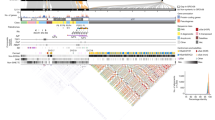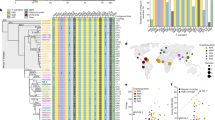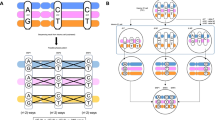Abstract
PROGRESS in somatic cell genetics now allows more rapid and precise localisation of genes within the human genome. A large number of mouse × human hybrid cell lines are available, permitting the investigator to choose, for phenotype assay, lines with a particular reduced human chromosome complement. An increasingly large number of hybrid lines carrying rearranged chromosomes are also becoming available for regional localisation studies. We have used such hybrid cell lines to assign a gene coding for galactokinase (EC 2.7.1.6) to human chromosome 17 and to further localise the gene to band 21–22 on the long arm of the chromosome. Results from this study have provided new information Regarding the functioning of the genes coding for the Leloir pathway enzymes in man1, and have revealed a relatively close and potentially useful linkage between the genes for galactokinase and for thymidine kinase (EC 2.7.1.21).
This is a preview of subscription content, access via your institution
Access options
Subscribe to this journal
Receive 51 print issues and online access
$199.00 per year
only $3.90 per issue
Buy this article
- Purchase on Springer Link
- Instant access to full article PDF
Prices may be subject to local taxes which are calculated during checkout
Similar content being viewed by others
References
Cohen, R. M., and Segal, S., Metabolism, 22, 627–642 (1973).
Ruddle, F. H., Nature, 242, 165–169 (1973).
Thompson, L. H., Mankovitz, R., Baker, R. M., Wright, J. A., Till, J. E., Sminovitch, L., and Whitmore, G. F., J. Cell Physiol., 78, 431–439 (1971).
Hauschka, T. S., Weiss, L., Holridge, B. A., Cudney, T. L., Zumpft, M., and Plannsek, J. A., J. natn. Cancer Inst., 47, 343–359 (1971).
Littlefield, J., Proc. natn. Acad. Sci. U.S.A., 50, 568–576 (1968).
Tischfield, J. A., and Ruddle, F. H., Proc. natn. Acad. Sci. U.S.A., 71, 45–49 (1974).
Hayflick, L., Exp Cell Res., 37, 614–636 (1965).
McMorris, F. A., thesis, Yale Univ. (1972).
Kit, S., Dubbs, D. R., Pickarski, L. J., and Hsu, T. C., Exp. Cell Res., 31, 297–312 (1963).
Boone, C., Chen, T.-R., and Ruddle, F. H., Proc. natn. Acad. Sci. U.S.A., 69, 510–514 (1972).
McDougall, J. K., Kucherlapati, R., and Ruddle, F. H., Nature new Biol., 245, 172–175 (1973).
Littlefield, J. W., Science, 145, 709–710 (1964).
Miller, O. J., Allerdice, P. W., Miller, D. A., Breg, W. R., and Migeon, B. R., Science, 173, 244–245 (1971).
Munyon, W., Buchsbaum, R., Paoletti, E., Mann, J., Kraiselburd, E., and Davis, D., Virology, 49, 683–689 (1972).
Kit, S., Leung, W.-C., and Kaplan, L. A., Europ. J. Biochem., 39, 43–48 (1973).
Kucherlapati, R., McDougall, J. K., and Ruddle, F. H., New Haven Conference (1973): First International Workshop on Human Gene Mapping. Birth Defects: Original Article Series, X: 3, 108–110 (National Foundation, New York, 1974).
Nichols, E. A., and Ruddle, F. H., J. Histochem. Cytochem., 21, 1066–1081 (1973).
Migeon, B. R., Smith, S. W., and Leddy, C. L., Biochem Genet., 3, 583–590 (1969).
Nichols, E. A., Elsevier, S. M., and Ruddle, F. H., Cytogenet. Cell Genet., 13, 275–278 (1974).
Blume, K.-G., and Beutler, E., J. biol. Chem., 246, 6507–6510 (1971).
Adhya, S. L., and Shapiro, J. A., Genetics, 62, 231–247 (1961).
Bassel, J., and Mortimer, R., J. Bact., 108, 179–183 (1971).
Sun, N. C., Chang, C. C., and Chu, E. H. Y., Proc. natn. Acad. Sci. U.S.A., 71, 404–407 (1974).
Moorhead, P. S., Nowell, P. C., Mellman, W. J., Battips, D. M., and Hungerford, D. A., Exp Cell Res., 20, 613–616 (1960).
Caspersson, T., Zech, L., Johansson, C., and Modest, B. J., Chromosoma, 30, 215–227 (1970).
Chen, T.-R., and Ruddle, F. H., Chromosoma, 34, 51–72 (1971).
Mayes, J. S., and Guthrie, R., Biochem. Genet., 2, 219–230 (1962).
Tischfield, J. A., Bernhard, H.-P., and Ruddle, F. H., Anal. Biochem., 53, 545–554 (1973).
Paris Conference (1971): Standardization in Human Cytogenetics. Birth Defects: Original Article Series VIII: 7, 18–19 (National Foundation, New York, 1972).
Author information
Authors and Affiliations
Rights and permissions
About this article
Cite this article
ELSEVIER, S., KUCHERLAPATI, R., NICHOLS, E. et al. Assignment of the gene for galactokinase to human chromosome 17 and its regional localisation to band q21-22. Nature 251, 633–636 (1974). https://doi.org/10.1038/251633a0
Received:
Revised:
Issue Date:
DOI: https://doi.org/10.1038/251633a0
This article is cited by
-
Molecular organization of recombinant human-Arabidopsis chromosomes in hybrid cell lines
Scientific Reports (2021)
-
XPA-210: a new proliferation marker to characterize tumor biology and progression of renal cell carcinoma
World Journal of Urology (2011)
-
Cloning of the galactokinase cDNA and identification of mutations in two families with cataracts
Nature Genetics (1995)
-
A progressive early onset cataract gene maps to human chromosome 17q24
Nature Genetics (1995)
-
Regulation of galactose-1-phosphate uridyltransferase gene expression
European Journal of Pediatrics (1995)
Comments
By submitting a comment you agree to abide by our Terms and Community Guidelines. If you find something abusive or that does not comply with our terms or guidelines please flag it as inappropriate.



